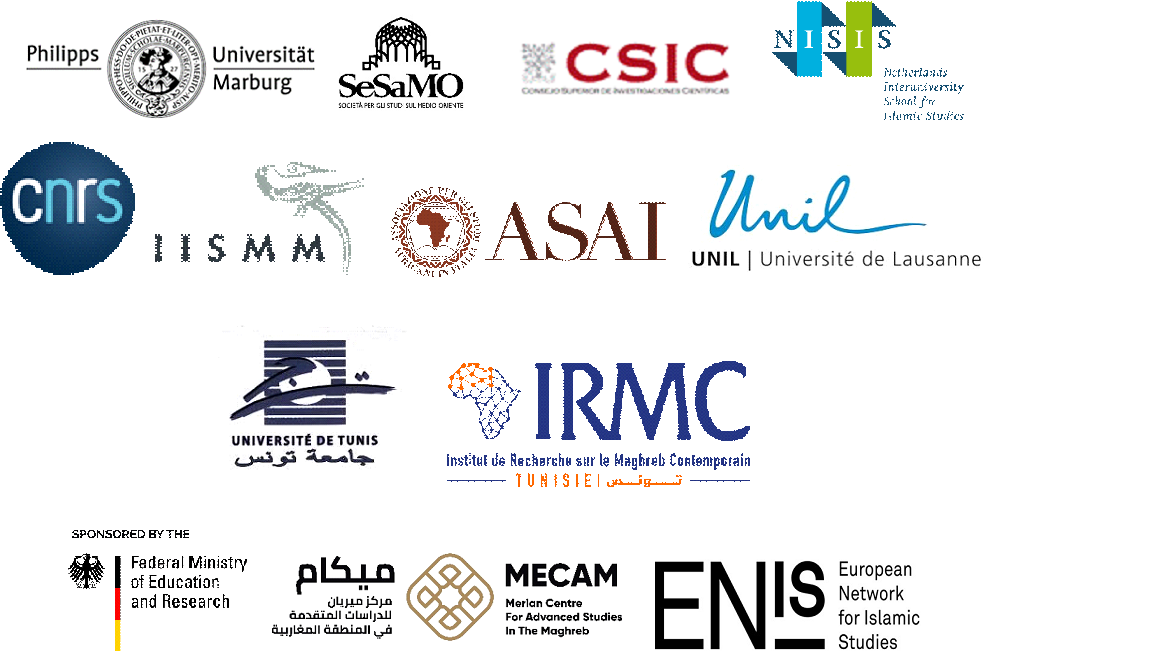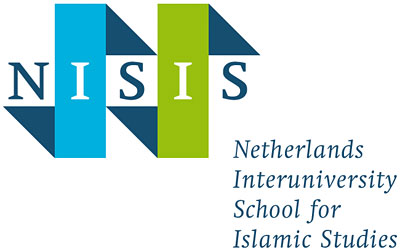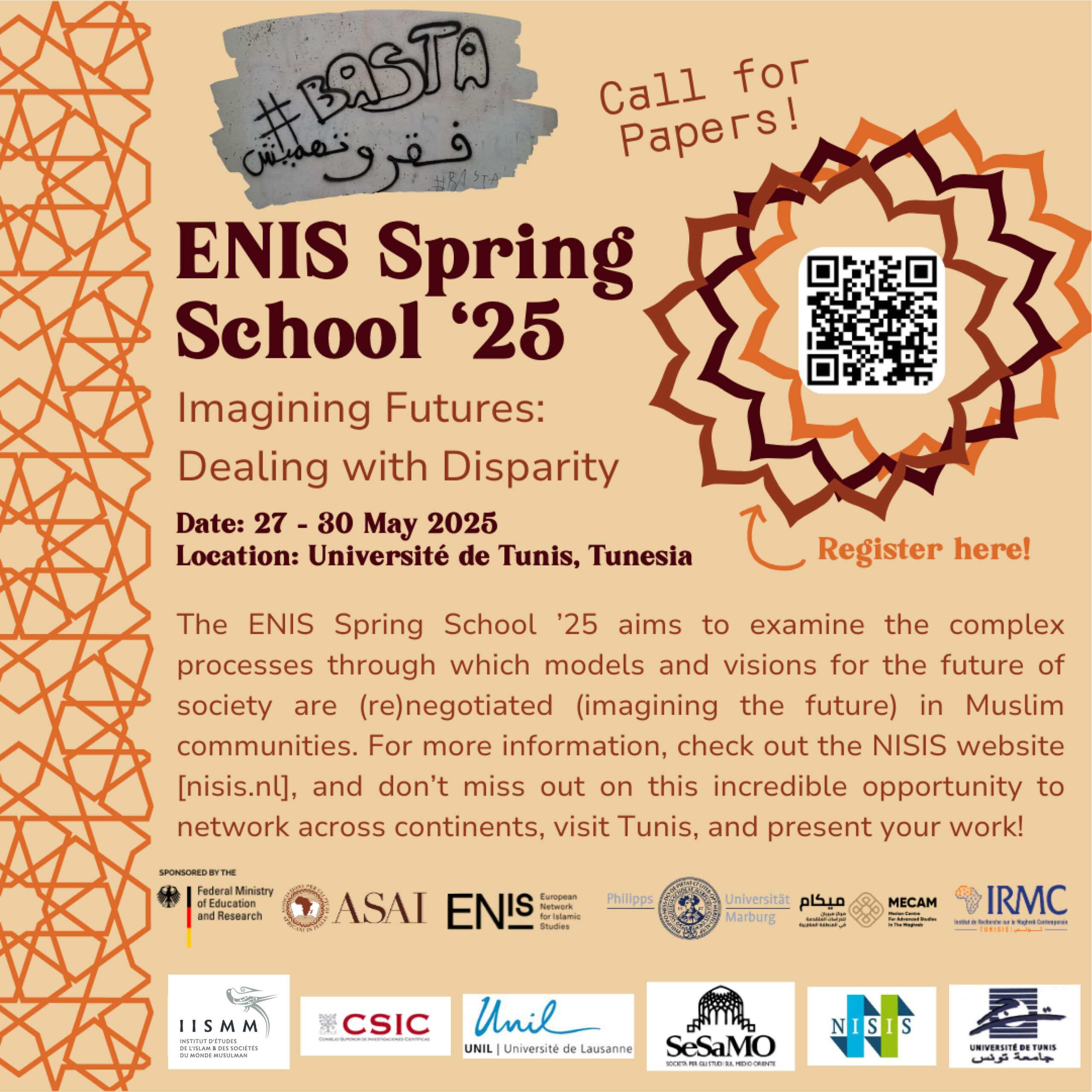Agenda
CfP: ENIS Spring School ’25: ‘Imagining Futures: Dealing with Disparity’
This CfP is closed. You can no longer submit your abstract.
The ENIS Spring School ’25 aims to examine the complex processes through which models and visions for the future of society are (re)negotiated (imagining the future) in Muslim communities. This process of (re)negotiation must be understood in the context of the profound disparities that characterize the regions of the world, taking into account economic, political, gender, class, and geographical dimensions, as well as religious discourses and positioning. In line with François Hartog’s concept of “Régimes d’historicité” (2003), an anticipated future always suggests a projection into history—thus, the future can be seen as a construct shaped and imagined based on everyday and past realities.
At the academic level, the concept of “Imagining Futures” has been integrated into various disciplinary debates, including geography (Gregory, 1993; Harvey, 2000), economics (Lanier, 2014; Beckert, 2016), ethics (Bowles, 2018), and anthropology (Appadurai, 2013). The notion of “disparity” refers to various forms of inequality, including their spatial and temporal dimensions. It expresses the unequal power imbalances within societies, as well as differing norms and ways of life. The term captures inequalities as “avoidable, morally unjustified, hierarchical differences” (Therborn, 2002) in income, social status, gender and race relations, cultural dominance, and access to social resources such as education, employment, and healthcare.
While inequalities exist in all societies, Tunisian or Maghreb perspectives may offer new or alternative viewpoints and experiences, possibly even models for addressing issues of inequality and envisioning the future. Against this backdrop, the ENIS Spring School ’25 was designed to trace the processes through which societal models of the future are developed in past and present and (re)negotiated, all while keeping in mind the profoundly unequal conditions from which these models emerge. To this end, the ENIS Spring school ’25 will consider various societal actors as well as the specific temporal and spatial contexts that define the disparate starting points for future models.
Representations of the future, including religious projects, play a crucial role in shaping how identities are formed and transformed, particularly in contexts marked by significant disparities (Esposito 2010). Religious discourses, often infused with utopian or eschatological visions, contribute to shaping collective aspirations and societal projects by either integrating or challenging existing power structures (Ahmed 2017). Islamic studies offer a compelling lens for exploring these conceptions of the future, especially as they are rooted in past utopias. The rise and fall of various Islamic empires were often accompanied by specific promises of future visions, reflecting the idea that every moment in history carried its own unique vision of the future. For example, in the pre-modern Muslim world, practices like fortune-telling and astrology were widespread, and a central theme in Islam was the promise of salvation in the afterlife. Extensive literature detailed what one might expect in the hereafter, with the imagery of paradise and hell employed to assure compensation for social inequalities and hardships in this life (Lange 2015). This promise of salvation not only depicted God’s justice but also ensured that even criminals would face judgment on the Day of Judgment. This concept is also relevant to historical studies, such as examining the future outlook in thirteenth-century Baghdad after the Mongol conquest. This approach acknowledges that each moment in the past had its own distinct future, shaped by prevailing beliefs and practices.
This ENIS Spring School thus explores the connection between multidimensional inequality and forward-looking ideas and models in the societies of the historical and contemporary Muslim communities. The focus is on complex social, political, cultural, and economic processes, as well as on issues of common interest and concern that have historically and presently both divided and connected regions with others. These include belief systems, resource distribution, cultural transformations, migration, the rule of law, socio-economic conflicts, and (transitional) justice.
Following this line of thought, the study of Islam cannot be fully understood without considering how Muslims, in various unequal contexts, imagine and aspire to future realities. These imagined futures, in turn, shape belief systems, practices, and the development of Islamic thought and society.
The ENIS Spring School ’25 provides an opportunity for researchers from different academic disciplines and regions of the world to come together to discuss these topics and to build and strengthen academic networks.
Confirmed keynote speakers:
Prof. Maurits Berger, professor of Islam and the West and holds the Sultan of Oman Chair for Oriental Studies at Leiden University.
Jörg Matthias Determann, associate Professor of History at Virginia Commonwealth University in Qatar.
Prof. Albrecht Fuess, professor of Islamic studies at Philipps-Universität Marburg.
Dr. Asma Helali, associate professor of Islamic studies at the University of Lille, France.
Prof. Hayet Amamou, former dean of the Faculty of Humanities and Social Sciences at the University of Tunis, director of the Laboratory of History of Economies and Mediterranean Societies, and the director of Cahiers de Tunisia (Journal of the Faculty).
The ENIS Spring School’s Co-Organizers:
European Network for Islamic Studies (ENIS):
ENIS is a collaboration between the following institutions: The Netherlands Interuniversity School for Islamic Studies (NISIS, Netherlands); Institut d’études de l’Islam et des sociétés du monde musulman (IISMM, France); The Center for Near and Middle Eastern Studies (CNMS at the Philipps-Universität Marburg, Germany); El Consejo Superior de Investigaciones Científicas (CSIC – the Spanish National Research Council, Spain); Società per gli Studi Sul Medio Oriente (SeSaMO, Italy) and the Institute of History and Religious Anthropology (IHAR) at the University of Lausanne (Unil, Switzerland).
Merian Centre for Advanced Studies in the Maghreb (MECAM):
MECAM is a research centre for interdisciplinary research and academic exchange based in Tunis. MECAM promotes the internationalization of research in the humanities and social sciences across the Mediterranean. Under its guiding theme “Imagining Futures – Dealing with Disparity”, MECAM aims to discuss the (re)negotiation of complex social and political conditions and expectations, norms and legacies in the wake of the “Arab Spring” in the Maghreb, the Middle East, Europe and beyond. The centre invites scholars at different stages of their career to take part at MECAM’s interdisciplinary fellow programme. Furthermore, MECAM organizes various events, such as seminars, lectures, public debates and traveling academies that connect researchers and discuss research outcomes. MECAM, funded by the German Federal Ministry of Education and Research (BMBF), is a joint endeavour of a consortium of seven Tunisian and German research institutions: It is coordinated by the Philipps-Universität Marburg and the Université de Tunis and supported by the Universität Leipzig, the German Institute for Global and Area Studies (GIGA) in Hamburg, the Forum Transregionale Studien in Berlin and the Université de Sfax. For more information, visit: www.mecam.tn

Bibliography
- Ahmad, Shahab, What is Islam ?: The Importance of Being Islamic, PUP: 2017.
- Appadurai, Arjun. The Future as a Cultural Fact: Essays on the Global Condition. London: Verso Books, 2013.
- Beckert, Jens. Imagined Futures. Fictional Expectations and Capitalist Dynamics. Cambridge: Harvard University Press, 2016.
- Bowles, Cennydd. Future Ethics. East Sussex: NowNext Press, 2018.
- Gregory, Derek. Geographical Imaginations. Cambridge/Oxford: Wiley-Blackwell Publishers, 1993.
- Esposito, John, The Future of Islam, Oxford: OUP 2010.
- Hartog, François. Regimes of Historicity: Presentism and Experiences of Time. Columbia University Press, 2016.
- Harvey, David. Spaces of Hope. Berkeley: University of California Press, 2000.
- Lange, Christian. Paradise and Hell in Islamic Traditions (Themes in Islamic History). Cambridge, 2015.
- Lanier, Jaron. Who Owns the Future? New York: Simon & Schuster, 2014.
- Therborn, Goran. “The Killing Fields of Inequality: What Are the Contemporary Causes of Inequality in the World?” International Journal of Health Services 42/4 (2012): 579-89.


